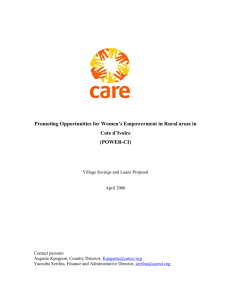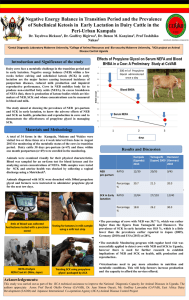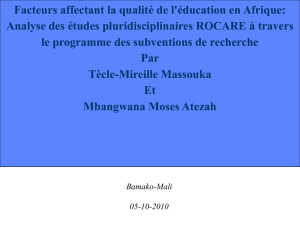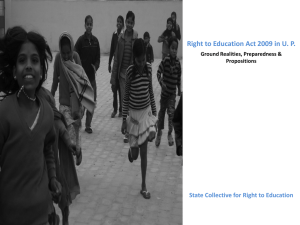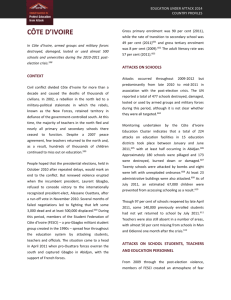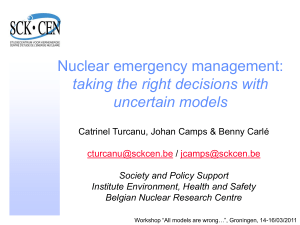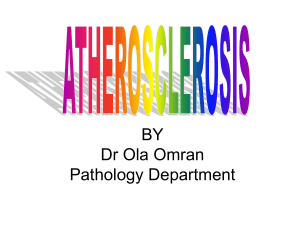1 July 2015 Terms of Reference Short Term Consultancy for Save
advertisement
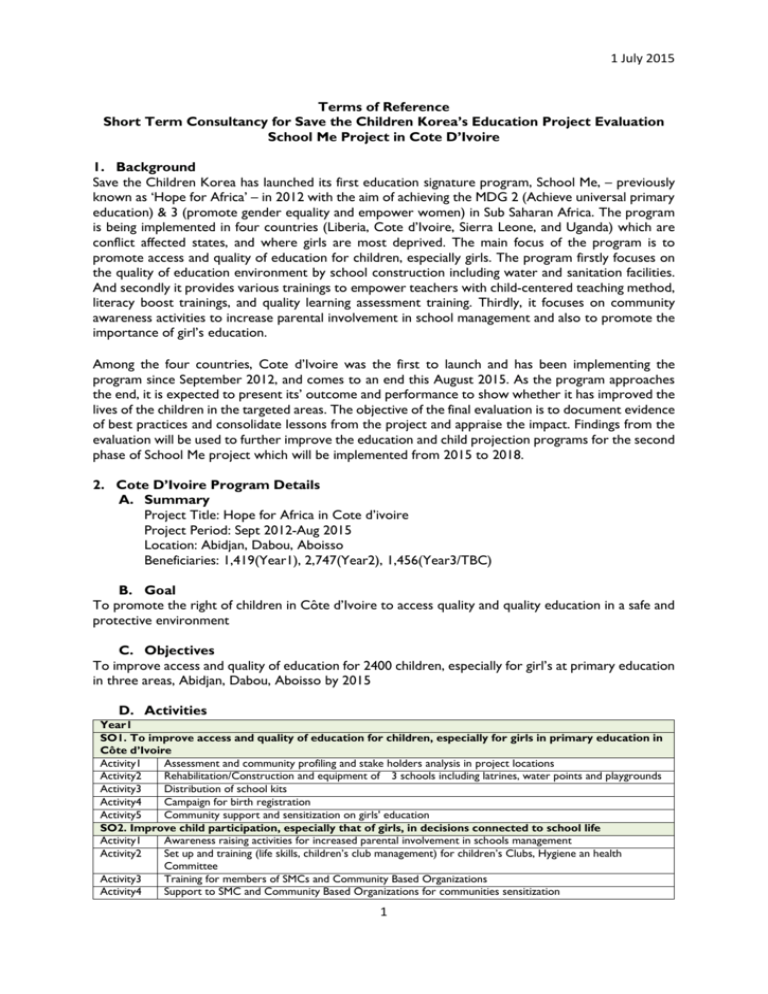
1 July 2015 Terms of Reference Short Term Consultancy for Save the Children Korea’s Education Project Evaluation School Me Project in Cote D’Ivoire 1. Background Save the Children Korea has launched its first education signature program, School Me, – previously known as ‘Hope for Africa’ – in 2012 with the aim of achieving the MDG 2 (Achieve universal primary education) & 3 (promote gender equality and empower women) in Sub Saharan Africa. The program is being implemented in four countries (Liberia, Cote d’Ivoire, Sierra Leone, and Uganda) which are conflict affected states, and where girls are most deprived. The main focus of the program is to promote access and quality of education for children, especially girls. The program firstly focuses on the quality of education environment by school construction including water and sanitation facilities. And secondly it provides various trainings to empower teachers with child-centered teaching method, literacy boost trainings, and quality learning assessment training. Thirdly, it focuses on community awareness activities to increase parental involvement in school management and also to promote the importance of girl’s education. Among the four countries, Cote d’Ivoire was the first to launch and has been implementing the program since September 2012, and comes to an end this August 2015. As the program approaches the end, it is expected to present its’ outcome and performance to show whether it has improved the lives of the children in the targeted areas. The objective of the final evaluation is to document evidence of best practices and consolidate lessons from the project and appraise the impact. Findings from the evaluation will be used to further improve the education and child projection programs for the second phase of School Me project which will be implemented from 2015 to 2018. 2. Cote D’Ivoire Program Details A. Summary Project Title: Hope for Africa in Cote d’ivoire Project Period: Sept 2012-Aug 2015 Location: Abidjan, Dabou, Aboisso Beneficiaries: 1,419(Year1), 2,747(Year2), 1,456(Year3/TBC) B. Goal To promote the right of children in Côte d’Ivoire to access quality and quality education in a safe and protective environment C. Objectives To improve access and quality of education for 2400 children, especially for girl’s at primary education in three areas, Abidjan, Dabou, Aboisso by 2015 D. Activities Year1 SO1. To improve access and quality of education for children, especially for girls in primary education in Côte d’Ivoire Activity1 Assessment and community profiling and stake holders analysis in project locations Activity2 Rehabilitation/Construction and equipment of 3 schools including latrines, water points and playgrounds Activity3 Distribution of school kits Activity4 Campaign for birth registration Activity5 Community support and sensitization on girls' education SO2. Improve child participation, especially that of girls, in decisions connected to school life Activity1 Awareness raising activities for increased parental involvement in schools management Activity2 Set up and training (life skills, children’s club management) for children’s Clubs, Hygiene an health Committee Activity3 Training for members of SMCs and Community Based Organizations Activity4 Support to SMC and Community Based Organizations for communities sensitization 1 1 July 2015 Activity5 Distribution of books: Activities around reading in schools and communities (reading festival, reading competitions, day of reading) SO3. A clean and protective school environment is promoted. Activity1 Advocacy to implement at national level a teacher’s code of conduct Activity2 Training for children, teachers and SMCs on “education on peace and citizenship” Activity3 Training for children, teachers and SMCs on child protection thematic (children rights, alternative to PHP) Activity4 Support to children’s clubs and SMCs in awareness raising on children protection/Sensitization of teacher’s union on child protection Year2 SO1. Increased the Enrolment of 2400 Children especially girl’s in 8 primary schools in Côte d’Ivoire Activity1 Baseline assessment and community profiling and stake holders analysis in project locations Activity2 Construction and equipment of schools including latrines, water points and playgrounds Activity3 Construction of canteens in beneficiary schools of year one and two Activity4 Distribution of school kits Activity5 Community support and sensitization on girls' education Activity6 Campaign for birth registration SO2. Increased community and children participation especially girls in management and in decision making in 8 Primary schools Activity1 Awareness raising activities for increased parental involvement in schools management Activity2 Set up and training (life skills, children’s club management) for children’s Clubs, Hygiene an health Committee Activity3 Set up and training for mothers' clubs to support girls during activities of life’s skills Activity4 Support to mother’s clubs during life’s skills activities Activity5 Training for members of SMCs and Community Based Organizations Activity6 Support to SMC and Community Based Organizations for communities sensitization Activity7 Distribution of books Activity8 Activities around reading in schools and communities (reading festival, reading competitions, day of reading) SO3. Safe school is promoted in 8 Primary Schools Activity1 Advocacy to implement at national level a teacher’s code of conduct Activity2 Training for children, teachers and SMCs on “education on peace and citizenship” Activity3 Training for children, teachers and SMCs on child protection thematic (children rights, alternative to punishment) Activity4 Support to children’s clubs and SMCs in awareness raising on children protection Activity5 Establish child friendly environment at schools : outside games areas, latrines, fences, water points Activity6 Sensitization of teacher’s union on child protection Year3 SO1. Increased the Enrolment of 2400 Children especially girl’s in 8 primary schools in Côte d’Ivoire Activity1 Baseline assessment and community profiling and stake holders analysis in project locations Activity2 Rehabilitation and equipment of schools including latrines, water points, canteen and playgrounds Activity3 Distribution of school kits Activity4 Community support and sensitization on girls' education Activity5 Campaign for birth registration SO2. Increased community and children participation especially girls in management and in decision making in 8 Primary schools Activity1 Awareness raising activities for increased parental involvement in schools management Activity2 Set up and training (life skills, children’s club management) for children’s Clubs, Hygiene an health Committee Activity3 Set up and training for mothers' clubs to support girls during activities of life’s skills Activity4 Support to mother’s clubs during life’s skills activities Activity5 Training for members of SMCs and Community Based Organizations Activity6 Distribution of books Activity7 Activities around reading in schools and communities (reading festival, reading competitions, day of reading) SO3. Safe school is promoted in 8 Primary Schools Activity1 Advocacy to implement at national level a teacher’s code of conduct Activity2 Training for children, teachers and SMCs on “education on peace and citizenship Activity3 Training for children, teachers and SMCs on child protection thematic (children rights, alternative to punishment) Activity4 Support to children’s clubs and SMCs in awareness raising on children protection Activity5 Establish child friendly environment at schools : outside games areas, latrines, fences, water points Activity6 Sensitization of teacher’s union on child protection 2 1 July 2015 3. Scope and Focus of the Evaluation A. Purpose of the Evaluation The evaluation has two main purposes. The first purpose of the evaluation is to find out the best practices and challenges of the project, and to understand how results have occurred, and to learn from its implementation. The second purpose is to draw recommendations from the evaluation results to use for the program design in School Me 2nd phase. B. Framing the Evaluation The consultant should review the documentation to establish a working theory of change of the program to confirm with stakeholders in SCK and on the ground in Cote d’Ivoire. This will enable adaptation of the evaluation question, determine where the impact for children will be and hone in on what “best practices” the evaluation is looking for. C. Evaluation Questions The evaluation firstly may adapt the DAC evaluation criteria, but it is advisable to revise the criteria and its detailed questions as preferable to the project evaluation purpose. The below is the expected and proposed evaluation questions which can be revised when the detailed evaluation plan is finalized. Criteria Expected questions Relevance - Measures to what extent the activity is suited to the project goal and objectives - Are the activities and outputs of the project consistent with the goal and the objectives? - How has the project empowered girls in the school? Effectiveness - Measures to which extent the activity attains its objectives - What factors contributed most to the objective of the project? (What are the success factors? (Assess how effective and appropriate the project approach was, and how far the project objective set in the annual reports has been achieved.) - How were the project objectives consistent with the needs of the target groups (children, teachers, community people etc)? - What were the challenges and lessons learned? (Identify major lessons learned on the success factors, innovation approaches and major challenges that can help to inform program personnel in designing programs that address girl’s education.) - What factors should be strengthened in the 2nd phase? (Recommendations) Efficiency - Measures the outputs in relation to the inputs - Was the project planned and implemented in the most efficient way? - Were the activities cost-efficient? - Were the activities and objectives achieved on time? Impact - Positive and negative changes produced by the project - What has happened in the community as a result of the project? (economical changes, social behavior changes) - To what extent the project has contributed to the community development? Sustainability - Measure if the benefits of the project are likely to continue after the funding has been withdrawn - What were the major factors which influenced the achievement or non-achievement of sustainability of the project? 3 1 July 2015 - What phase out criteria is needed? (Assess what measures are in place/or should be in place that the project achievements, results and interventions will be sustained after the project phases out) D. Proposed Budget: The budget includes personnel and administration cost as well as the field visit cost. (up to USD 20,000) The detailed budget plan should be prepared by the Evaluation team and submitted with the inception report as per the schedule. The detail budget should take in account all the expected deliverables below: E. Expected Deliverables : English S.N Deliverables 1 Inception Report 2 Kick-off Meeting 3 Literature Review 4 Evaluation Instruments 5 First Draft Evaluation Report Description Timeline Detailed evaluation plan, review of SCK MEAL Checklist1, relevant government policies and refinement of evaluation questions, identification of data collection instruments and sampling procedures, sample size, target groups, coverage, list of documents for literature review, and dissemination plan. Meeting with SCK IP team, CO, consultant to share the purpose of the evaluation, schedule with detailed activities, and the expected outputs. Conduct a complete literature review of the projects included in the evaluation, as well as review of other relevant documents, donor reports, government reports, etc. Development of quantitative and qualitative questionnaires guides and tools, and training of data collectors. Data collection completed, data Within two weeks from the date of contract Within two weeks after the contract signed Dates possibles 14 Août 14 Août Within two week after the approval of inception report Within two weeks after the literature review Within one month after approval of The evaluation should incorporate the SCK’s MEAL checklist as a framework to apply standardized standards for the education aspect on the evaluation. 1 4 1 July 2015 6 Final Draft Report 7 Final Report 8 Dissemination/Closing Workshop organization, cleaning and analysis completed a draft report from field data as well as literature review prepared and submitted to SCK and SCI in CIV for comments. All comments from SCK and SCI in CIV are incorporated into the draft report, and final draft submitted to SCK. A final report with satisfactory incorporation of comments delivered to SCK – Upon approval of the final report and dissemination. Share results and findings, and recommendations with SMT and relevant stakeholders on School Me Project. and design implementation plan for recommendations research/evaluation tools Within two weeks of receiving comments on first draft Within two weeks of receiving comments on final draft Within a week of completing the final report 4. Proposed Work Schedule: A total of 40 days is allocated to the consultant. The evaluation should commence by 1st August 2015 and end September 25th by the report validation workshop. 5. Duty station: Cote D’Ivoire 6. Evaluation Team A. Profile for consultant(evaluation team) Evaluation will be conducted by national institute and/or consultant in CIV, independent of Save the Children, which has relevant academic as well as extensive practical research and evaluation experience Evaluation team should have demonstratable expertise in qualitative evaluation methodologies, including assessing behaviors, participatory research techniques and interviewing children Experience of evaluation child protection and education will be an added advantage Evaluation team must have excellent writing skills in English and/or French (If the report is written in French needs to be translated into English-should be included in the budget) Evaluation team must abide by Save the Children Child Safeguarding Policy throughout the agreement period B. Roles and Responsibilities Save the Children Korea : TOR, review of draft & final report 5 1 July 2015 Save the Children International in Cote D’Ivoire : contract with consultant/research institution, budget review, review of draft & final, Support logistics for field visit, coordination of visit Consultant/Evaluation Team : literature review, field review, data collection & analysis, final report 7. Terms and conditions a. The consultant shall bear the following expenses for the duration of his service: 1. Transportation and accommodation for investigators 2. Per diems and insurance costs for interviewers if necessary 3. However, he may use Save the Children’s office for workshops and meetings with the investigators. b. Save the Children will deduct 7.5% of taxes on consultant fees c. Save the Children will not incur other expenditures outside of those provided in the final technical offer and approved by its services with the consultant. 8. Attached Documents A. Cote D’Ivoire School Me Project Proposal/Reports(Final) B. SCK MEAL Checklist for Education /The end of the document/ 6

